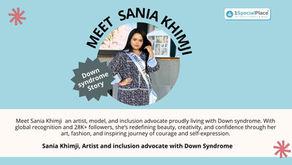OVERVIEW
What is Genetic Disorder?
Genetic disorders are conditions caused by changes or mutations in a person’s DNA. These mutations can affect a child’s physical health, cognitive development, or overall functioning. A genetic disorder may be inherited from one or both parents or can arise spontaneously. These disorders are often classified into two main categories: monogenic disorders (caused by mutations in a single gene) and chromosomal disorders (resulting from changes in the number or structure of chromosomes).
Genetic disorders can lead to genetic disabilities that impact a child's quality of life, affecting various aspects such as growth, development, and even lifespan. Understanding the causes, types, and symptoms of these disorders is essential for early diagnosis, treatment, and effective management. Some genetic disorders are inherited, while others occur due to spontaneous genetic mutations.
Types of Genetic Disorders
Genetic disorders encompass a wide range of conditions, each with unique causes, symptoms, and impacts on a child’s health. Some common genetic disorder types include:
-
Monogenic Disorders: These result from mutations in a single gene. Examples include:
-
Cystic fibrosis
-
Sickle cell anemia
-
Tay-Sachs disease
-
Huntington's disease
-
-
Chromosomal Disorders: These disorders are caused by changes in the number or structure of chromosomes. Some well-known chromosomal conditions are:
-
Down syndrome (Trisomy 21)
-
Turner syndrome
-
Klinefelter syndrome
-
Patau syndrome
-
-
Mitochondrial Disorders: Caused by mutations in the mitochondria (the energy-producing parts of cells), these conditions can lead to neurological, muscle, and organ dysfunction. Examples include Leber's hereditary optic neuropathy.
-
Genetic Syndromes: A syndrome is a collection of symptoms that occur together and are linked to a genetic condition. Common genetic syndromes include:
-
Marfan syndrome
-
Williams syndrome
-
Prader-Willi syndrome
-
01
Diagnosis
Early diagnosis is key to managing genetic disorders in children. If a genetic disorder is suspected, a healthcare provider may suggest several diagnostic tests, including:
-
Genetic Testing: This involves analyzing a child’s DNA to detect mutations or genetic markers associated with specific genetic disorders. Techniques like chromosome analysis, next-generation sequencing, and targeted gene testing are commonly used.
-
Prenatal Screening: For expecting parents, genetic screening tests like amniocentesis or chorionic villus sampling (CVS) can help detect chromosomal disorders like Down syndrome and other genetic conditions before birth.
-
Newborn Screening: Many countries offer newborn screening to identify rare genetic conditions early, allowing for prompt intervention.
-
Family History and Genetic Counseling: A healthcare provider may also recommend genetic counseling to assess the likelihood of inheriting a genetic disorder based on family history and other risk factors.
02
Risk Factors
Genetic disorders can occur due to several causes, including inherited mutations, chromosomal abnormalities, and spontaneous genetic changes. Below are the most common genetic disorder causes and risk factors associated with genetic disorders:
-
Inherited Mutations: Many genetic disorders are inherited from one or both parents. If a parent carries a mutation in their genes, the child may inherit the condition. For example, sickle cell disease and cystic fibrosis are autosomal recessive conditions passed down from parents to children.
-
Chromosomal Disorders: Chromosomal disorders occur when a child has an abnormal number or structure of chromosomes. This can happen due to errors during cell division, leading to conditions such as Down syndrome(Trisomy 21), Turner syndrome, and Klinefelter syndrome.
-
Spontaneous Genetic Mutations: Some genetic disorders arise from mutations that occur spontaneously in a child’s DNA. These mutations are not inherited from parents but happen during the formation of the egg or sperm, or after conception. Autism spectrum disorder (ASD), for example, may be associated with spontaneous mutations in some cases.
-
Environmental Factors: While genetic factors primarily contribute to genetic disorders, certain environmental influences (like exposure to toxins, radiation, or infections during pregnancy) can also increase the risk of genetic problems.
-
Age of Parents: Advanced maternal and paternal age can increase the risk of genetic disorders, as older parents may have a higher likelihood of passing on genetic mutations. This is particularly true for chromosomal conditions such as Down syndrome.
03
Treatment
While many genetic disorders cannot be cured, there are treatments available to manage symptoms, improve quality of life, and prevent complications. Treatment for genetic diseases options vary depending on the type of genetic disorder and the severity of symptoms. Some approaches include:
-
Medications: For many genetic conditions, medications can help manage symptoms. For example, insulin for diabetes mellitus type 1 (a genetic condition) or bronchodilators for cystic fibrosis to improve lung function.
-
Gene Therapy: This emerging treatable genetic disorders involves replacing or repairing faulty genes to treat genetic disorders. It holds promise for conditions like Duchenne muscular dystrophy and certain types of cystic fibrosis.
-
Physical, Occupational, and Speech Therapy: Many children with genetic disorders, such as cerebral palsy or Down syndrome, may benefit from therapies that improve motor skills, speech development, and daily living skills.
-
Surgical Interventions: In some cases, surgery may be needed to address physical abnormalities or complications associated with genetic disorders. For instance, corrective surgery may be required for cleft lip/palate or heart defects in conditions like Down syndrome.
-
Supportive Care: Managing a genetic disorder often involves ongoing medical care, including regular checkups, nutritional support, and assistance with mobility, if necessary.
04
Tips for Parents
-
Educate Yourself and Stay Informed: Understanding your child’s specific genetic condition will empower you to make informed decisions about treatment options and therapies. Look for reputable sources and consider joining support groups to connect with others facing similar challenges.
-
Seek Early Intervention: Early diagnosis and intervention are crucial for managing many genetic disorders. Work with a team of healthcare professionals to develop a personalized treatment plan that addresses your child’s unique needs.
-
Support Emotional and Social Development: Children with genetic disorders may face emotional and social challenges. Encourage their strengths, help them build self-esteem, and seek counseling or therapy if needed.
-
Create a Routine: A consistent daily routine can help children with genetic disorders feel more secure and reduce anxiety, particularly for children with developmental or cognitive delays.
-
Focus on Nutrition: Some genetic disorders affect a child's growth or metabolism. Consult with a nutritionist to ensure your child receives the proper nutrition to support their overall health and development.
-
Take Care of Yourself: Caring for a child with a genetic disorder can be demanding. Don't forget to prioritize your own well-being. Seek support when needed, whether through family, friends, or professional counselors.
CHANGE STARTS WITH AWARENESS







